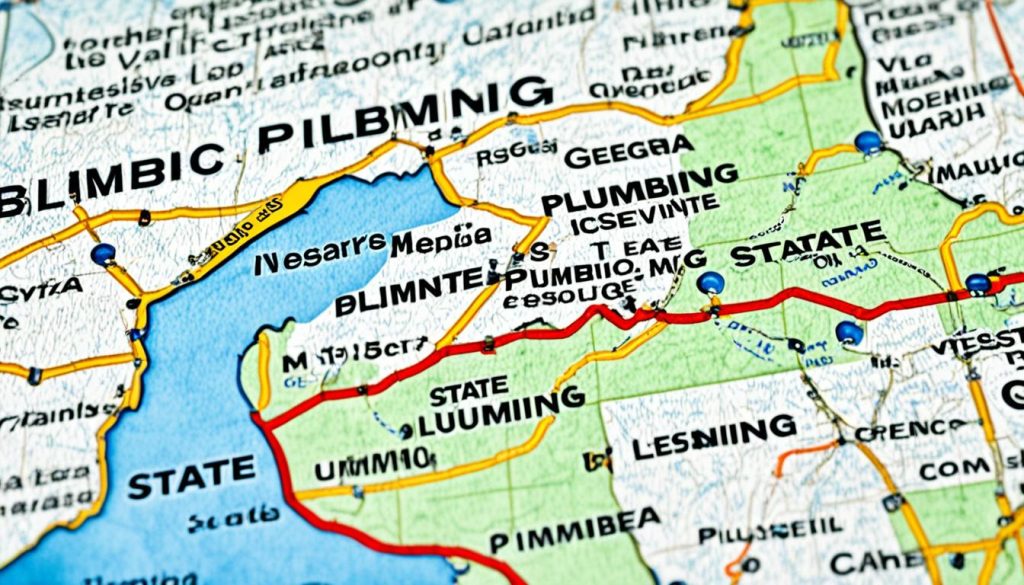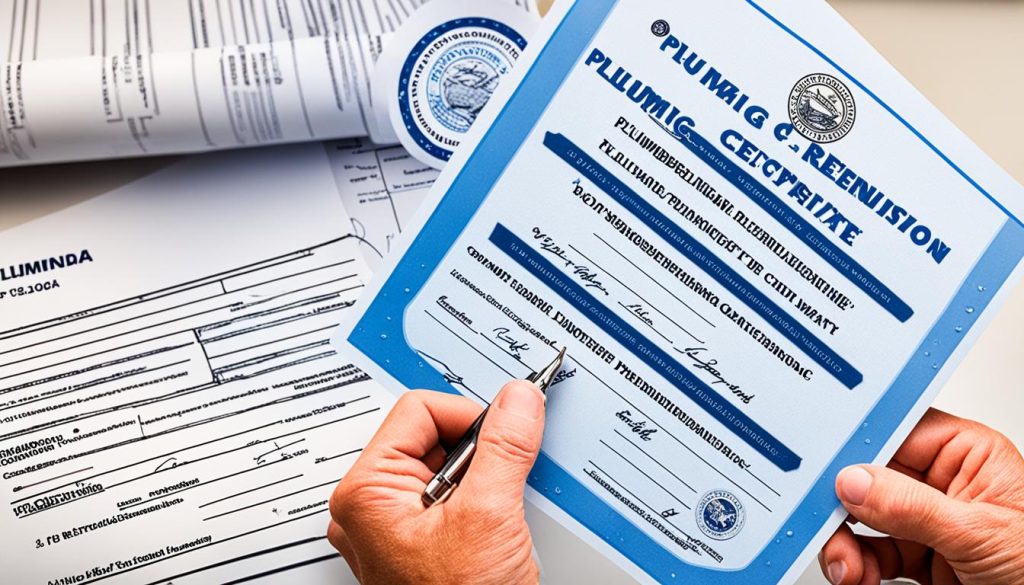Get Your Plumbing License in Georgia Today!
Did you know that in order to legally work as a plumber in Georgia, you must obtain a plumbing license? That’s right! Georgia has specific requirements and steps that you need to follow in order to get your license and start your plumbing career. Understanding the plumbing regulations in Georgia and the process of obtaining a plumbing license is key to becoming a licensed plumber in the state.
Key Takeaways:
- Obtaining a plumbing license is a requirement to legally work as a plumber in Georgia.
- Understanding the plumbing regulations in Georgia and the process of obtaining a license is crucial.
- There are specific requirements and steps that you need to follow to get your plumbing license in Georgia.
- By following these steps, you can start your journey towards becoming a licensed plumber in Georgia.
- A plumbing license opens up various opportunities for your career and ensures compliance with the state’s regulations.
Licensing Requirements for Plumbers in Georgia
In Georgia, it is illegal to perform any type of plumbing work without a license. To become a licensed plumber in Georgia, you must either complete an apprenticeship or attend a trade school.
The state of Georgia requires a minimum of three years of work experience as an apprentice plumber before you can apply for a journeyman plumber license. This work experience is crucial to developing the necessary skills and knowledge in the field of plumbing.
Additionally, there are specific contractor license requirements that you must meet. These requirements vary depending on the type of license you are applying for. The Georgia contractor license requirements ensure that plumbers have the necessary expertise to carry out plumbing work.
Furthermore, all plumbing work in Georgia must adhere to the Georgia plumbing code. The Georgia plumbing code sets the standards and guidelines for all plumbing installations, repairs, and maintenance in the state. Plumbers must be familiar with the code and ensure that their work meets the required standards for safety and efficiency.
| Type of License | Experience Requirements |
|---|---|
| Journeyman License | Minimum of three years of work experience as an apprentice plumber |
| Master License Class 1 Restricted | Minimum of five years of work experience |
| Master License Class 2 Unrestricted | Minimum of five years of work experience |
It is important to note that obtaining a plumbing license in Georgia is a significant step towards establishing yourself as a professional in the industry. It not only ensures that you meet the legal requirements, but also showcases your expertise and dedication to providing high-quality plumbing services to customers.
Types of Plumbers Licenses in Georgia
In Georgia, aspiring plumbers have the opportunity to obtain different types of licenses to enhance their qualifications and career prospects. Let’s take a closer look at the three main types of plumbing licenses available:
- Journeyman License: To obtain a journeyman license in Georgia, you must have a documented three years of qualifying experience. This license allows you to work as a professional plumber in the state and demonstrates your expertise in the field.
- Master License Class 1 Restricted: The master license Class 1 restricted requires a minimum of five years of qualifying experience. With this license, you gain the ability to take on more complex plumbing projects and lead a team of plumbers.
- Master License Class 2 Unrestricted: Similar to the Class 1 restricted license, the master license Class 2 unrestricted also requires a minimum of five years of qualifying experience. However, this license provides you with even greater flexibility and authority to undertake a wide range of plumbing work.
Plumbing Certifications
In addition to the different types of licenses, there are various plumbing certifications available in Georgia that can further enhance your qualifications as a plumber. These certifications provide specialized knowledge and skills in specific areas of plumbing, such as backflow prevention or gas line installation. By obtaining these certifications, you can differentiate yourself in the industry and expand your career opportunities.
Whether you choose to pursue a journeyman license or aim for a master license, acquiring the necessary experience and certifications will set you on the path to success as a licensed plumber in Georgia.
| Type of License | Qualifying Experience |
|---|---|
| Journeyman License | Minimum three years |
| Master License Class 1 Restricted | Minimum five years |
| Master License Class 2 Unrestricted | Minimum five years |
Steps to Get a Plumber’s License in Georgia
If you’re looking to become a licensed plumber in Georgia, there are several steps you need to follow. Here’s a breakdown of the process:
- Meet the requirements: To be eligible for a plumbing license in Georgia, you must be at least 18 years old, have a high school diploma or GED, possess the physical capabilities necessary for plumbing work, and meet the required work experience.
- Gain work experience: One of the requirements for a plumbing license in Georgia is the completion of a specific amount of work experience. This experience can be obtained through an apprenticeship or by attending a trade school.
- Submit an application: Once you’ve met the requirements and gained the necessary work experience, you’ll need to fill out and submit an application for a plumbing license in Georgia. Make sure to provide all the required information accurately.
- Take and pass the licensing examination: To obtain your plumbing license, you’ll need to pass a licensing examination. This examination tests your knowledge and understanding of plumbing codes, regulations, and best practices.
- Pay the required fees: There are fees associated with getting a plumbing license in Georgia. Make sure to pay the required fees as part of the application process.
Renewal and Training Programs
It’s important to note that plumbers in Georgia are required to renew their license periodically. Renewal typically involves completing continuing education courses and paying the renewal fee.
If you’re interested in pursuing a career in plumbing or want to enhance your skills and qualifications, there are various training programs and schools available in Georgia. These programs provide comprehensive training and education on plumbing principles, practices, and regulations.
By following these steps, meeting the requirements, and staying up-to-date with the necessary training, you can obtain and maintain your plumbing license in Georgia.
Benefits of Getting a Plumbers License in Georgia
Getting a plumbing license in Georgia offers several benefits. First and foremost, it is required by law in Georgia to be licensed in order to perform any plumbing work. Having a license demonstrates your experience and skill as a plumber, and it allows you to:
- Operate a business
- Obtain commercial insurance
- Bid on public projects
- Increase your earning potential
Additionally, having a plumbing license provides protection for both your company and your customers. Being licensed ensures that you are knowledgeable about and compliant with Georgia plumbing regulations and the Georgia plumbing code. This helps to maintain the safety and integrity of plumbing systems and prevents potential risks or hazards. Having a license also gives you a competitive advantage in the job market, as many employers and clients prefer to work with licensed plumbers who have met the necessary qualifications.
In summary, getting a plumbers license in Georgia not only fulfills legal requirements but also offers various advantages. It allows you to establish yourself as a skilled and reputable professional, operate your own business, and increase your earning potential. It also ensures compliance with plumbing regulations and provides peace of mind for both you and your customers. So, if you’re considering a career in plumbing, obtaining a license in Georgia is a crucial step to take.
What Is the Mean Salary for a Plumber in Georgia?
According to the U.S. Bureau of Labor Statistics, the annual mean wage for a plumber in Georgia is $57,200. This salary can vary based on factors such as experience, education, certifications, and the city in which you work. It is important to note that in order to become a licensed plumber in Georgia, you must pass the plumbing license exam.
How Much Does It Cost to Get a Plumbers License in Georgia?
Getting a plumbing license in Georgia comes with several associated fees. Here is a breakdown of the costs:
- Application fee for a journeyman plumber: $30
- Exam fee for a journeyman plumber: $223
- Renewal fee for a journeyman plumber (every two years): $75
- Application fee for a master plumber Class 1 restricted or Class 2 unrestricted: $30
- Exam fee for a master plumber Class 1 restricted or Class 2 unrestricted: $267
- Renewal fee for a master plumber Class 1 restricted or Class 2 unrestricted (every two years): $75
When pursuing a plumbing license in Georgia, it is important to budget for these costs accordingly.
How Long Does it Take to Get a Plumbers License in Georgia?
The process of obtaining a plumbing license in Georgia can vary in duration depending on several factors. To qualify for a journeyman plumber license, you must first accumulate a minimum of three years of work experience as an apprentice plumber. This hands-on experience is crucial for building your skills and expertise in the field.
In addition to gaining the necessary work experience, aspiring plumbers in Georgia are required to complete training programs and schools. These programs provide comprehensive knowledge and training in plumbing techniques, safety protocols, and Georgia plumbing regulations. The duration of these programs can range from several months to a few years, depending on the level of training and the individual’s pace of learning.
Once you have completed the required work experience and training, you must then pass the plumbing license exam in Georgia. This examination validates your understanding of plumbing principles and ensures that you meet the state’s standards for licensure. It is important to note that the exam requires a minimum passing score of 70%.
Considering the time required for work experience, training programs, and preparation for the licensing exam, it is safe to say that the process of obtaining a plumbing license in Georgia can take several years to complete. However, the investment of time and effort is well worth it as it opens up opportunities for a rewarding and lucrative career as a licensed plumber.
Source Links
- https://www.servicetitan.com/licensing/plumbing/georgia
- https://huckleberry.com/blog/georgia-plumbing-license/
- https://sos.ga.gov/georgia-state-division-master-and-journeyman-plumbers
- Investing Wisely: How Windows & Doors in Boost Property Value and Financial Health - April 24, 2025
- The Financial Impact of Personal Injuries: Why Legal Help Matters for Business Owners - April 16, 2025
- The Hidden Financial Costs of Domestic Assault: What Business Owners Need to Know - April 16, 2025













